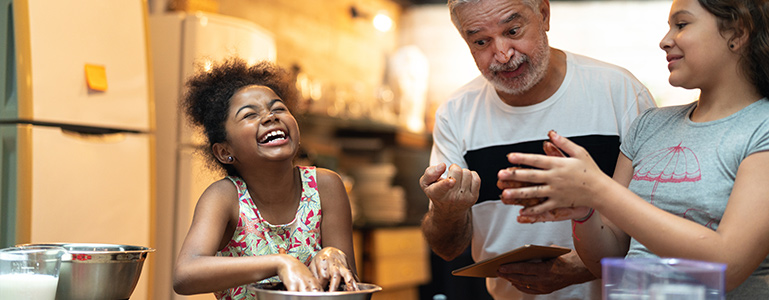By Kylie Hunter MOT, OTR/L
We all probably spend at least some time in the kitchen on a daily basis–and this time has most likely increased lately! Why not use kitchen time to create enjoyable and even educational experiences for the entire family! From science experiments to slime, cake decorating to cooking for others, there are endless opportunities for teachable moments and FUN!
Here are 8 ways to use the kitchen for positive learning experiences:
Follow a Recipe Together
Choose a recipe as a family and follow the step-by-step instructions. Have your child practice sequencing (1st, 2nd, 3rd steps) and even throw in a reading or math lesson while you’re at it.
Enhance Executive Functioning Skills
Work on planning ahead by prioritizing tasks: First, sanitize your space and set up necessary ingredients. Then, check for safety. Organize the space for efficiency, including utensils. Challenge your child’s working memory (by asking questions like, “Which step are we on?”) Practice patience while waiting for the end result. Teach resilience and problem-solving if something goes wrong.
Practice Gross and Fine Motor Development
Challenge your child to get moving by having them set the table, carry items, stir, knead, measure ingredients, pour, wash and dry dishes, sort utensils, open and close containers, and wipe tables and counters. Many of these activities are great for bilateral coordination too.
Teach Social Skills
Model good teamwork by helping one another achieve a common goal. Practice taking turns. Use the time in the kitchen as a chance to demonstrate generosity, perhaps by baking or cooking for another family member. Try making someone breakfast in bed! Use this time for a quick lesson on recycling and healthy eating habits.
Foster Creativity
Let your creativity shine through decorating or coming up with their own recipes. You could bedazzle cupcakes, ice cookies, or make fun pancake shapes. The opportunities are limitless! (Check out Pinterest too, for lots of wonderful ideas.)
Promote Sensory Experiences
Have your child go through the pantry and smell and/or taste different ingredients–as appropriate of course. Have them describe which textures and smells they like and don’t like. Let them feel ingredients and describe their consistency and properties together. (For example, is an ingredient pungent, sweet, soft, cold, warm, dry, or something else?)
Perform Science Experiments
Try using your everyday household ingredients to create a science lesson, You can try an old- fashioned volcano experiment using vinegar and baking soda, or teach about the properties of oil and water.
Make and Play with Some Non-Food Items
Look up some fun recipes for D.I.Y. Play-Doh, bubbles, Slime or edible finger paints, and have fun playing with the items you made together.
If you need support or guidance during this time, or are facing other challenges as a parent, JFCS’ Center for Children and Youth is here for you. Our team of parenting experts and clinicians can provide online counseling to help you and your family. We can also help you establish healthy family routines, connect with other parents, plan activities at home, and receive critical assistance when you need it most. Contact us at www.parentsplaceonline.org or call 650-688-3046.



